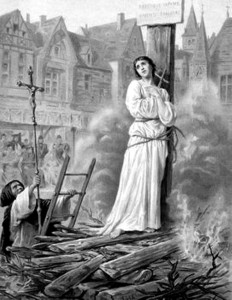I preached this sermon in 2011 when I was pastor of Covenant Presbyterian Church in Sherman, Texas. It is specific to that congregation, and dependent on the exegetical work of many different ministers, including Anna Carter Florence in Lectionary Homiletics.
“I was afraid, and I went and hid your talent in the ground. Here you have what is yours.’ Matthew 25:25
The easiest way to deal with a weapons-grade parable like this is to turn it into an allegory—turn it into a story in which each character stands in for someone and each thing stands in for something else. That way, when we get to the part about a worthless slave getting thrown into the outer darkness where there will be weeping and gnashing of teeth, we can make sure that the worthless slave is a stand-in for somebody else, not us.
The challenge we face, though, is that Jesus never took a course in literary forms of biblical literature; therefore, he felt free, and Matthew the writer of this parable felt free, to tell a story that sometimes works as an allegory and sometimes works as a parable.
“The Kingdom of heaven is as if . . .” That phrase begins a creative, imaginative story of a wealthy landowner, and we can easily make the connection, “O.K., wealthy powerful guy who owns everything, I know That Guy, it has to be God.”
We hear about the distribution of talents and we learn from the footnote that a talent is a huge measure of gold, but we make the automatic correlation with talents in the English language and think about the gifts God has entrusted to each of us.
We hear about the three slaves, two of whom do well and one who buries his talent in the ground and by this time, we’re on a roll, this is easy—that first guy is me, the good Christian, the second one is my friend, the first runner-up in the good Christian contest, and the third one, the one who deserves to be thrown into the outer darkness where there is weeping and gnashing of teeth? As I heard someone say in a Bible study once, “I know that guy! He’s my no-good lazy ex-husband!”
That’s always a comfortable way to read scripture – to weaponize it and wield it against somebody else. It may be comfortable, but it doesn’t hold up to a close reading.
The problem begins to arise when we hear the slave’s description of the wealthy landowner, as someone who reaps where he did not sow and gathers where he did not scatter. Maybe the third slave is just mistaken, but that sure isn’t a description of God who created the heavens and the earth. And, at the end, when he tells the third slave he should have invested the talent in the bank to collect interest? Interest is an acceptable way of doing business now, but in the first century Jewish culture, it was strictly forbidden by God’s law. It makes no sense that a stand-in for God would advocate such a thing as the least you can do.
And then, the word “talent.” Our English word “talent” comes from the Greek language in which Matthew wrote, but Jesus did not tell this parable in Greek, (he would have used the Aramaic/Hebrew word kikkar) and besides, the English language had not yet been invented. In its original context, there was no automatic correlation between this weight of gold or silver, 3000 shekels, and our contemporary word for gifts and skills.
So, what’s going on here?
Let’s think about how the parable would have been heard by the gospel writer Matthew’s congregation. This is the second of three parables in the twenty-fifth chapter telling us about a community that is waiting for the return of someone, but they do not know the day or the hour.
For a community that had expected Jesus to return any day, and it had now been forty years, and almost all of the people who had walked with Jesus had died, these parables address the question, “What are we supposed to do now? What do we do while we wait around to die or see the end of the world as we know it?”
This parable, along with the other three parables of the Kingdom in Matthew 25, make this much clear: the Gospel has been given to us, but not for us to have and to hold. Jesus gave us stories that we would repeat them; Jesus gave us his life that we might live for others. He gave us the bread of life and the cup of salvation that we would eat and drink and remember his presence from one day to the next.
We read the slave’s declaration, “Master, I knew you were a harsh man, reaping where you did not sow, and gathering where you did not scatter seed; 25so I was afraid, and I went and hid your talent in the ground. Here you have what is yours.’” And we realize, yes, that slave got it wrong on two fronts.
First, the Master he describes is not the One who sent his only Son to die that we might live.
And second, his misplaced fear led him to do exactly the opposite of what the Master desired.
It is human nature to hoard what we value, to try to keep it, save it, preserve it. The surprise of this parable, maybe the shocking recognition, is that the last thing Jesus wants to hear when he walks through those doors and into this sanctuary is, “Look Jesus, we kept it for you just the way it was when you gave it to us!”
It takes energy, intelligence, imagination, and love and all the gifts of the spirit to do what God has called us to do, to put it all out there, to risk proclaiming the gospel with all the assets with which God has entrusted us, whether it is money, or this building, or the new building, or our emotional reserve, or our style of worship, or anything else. It does not happen by accident, it only happens through a commitment and intent to be obedient to Christ even when we are afraid.
Many, many years ago, when I was still the new pastor here, [Covenant Presbyterian in Sherman, Texas] and we did not yet know each other well, I got a phone call from a funeral home while I was on vacation at Nancy’s mother’s house in Pensacola. A family member of an immigrant Hindu family had died, and they wanted to do the funeral service in Sherman where their friends and colleagues could attend. Wynne Chapel was being remodeled, and several other churches with a sanctuary large enough to accommodate them had declined to host a funeral in the Hindu tradition.
I thought, this would be a great discussion for our session to have, but I was thirteen hours away, the clock was ticking, and there was no way to get the session together in time to make this decision. I had to make it, yes or no.
When I thought, “What would Jesus do?” it was very clear to me. The one who told the story of the kind Samaritan, the foreigner who showed kindness to the stranger in need regardless of their religious differences would not hesitate to give them comfort in their time of grief.
I thought of that and all kinds of other reasons that it was the right thing to do as a church, and I tried to anticipate all the reasons people might give for declining to have it here.
I told the funeral home we would be glad to do it, and I ran down to the coffee shop with wifi where I could get an email out to the session that just said I had to make this decision today, here’s what I told them, and here’s why I think it’s the right thing to do.
I did not yet know you well. I feared I might get fired. I thought someone on session might take some disciplinary action against me to the Presbytery’s committee on ministry. I did not know what might happen.
But, I’m not the hero of this story. You are.
Here’s what happened. It turns out I was foolish in my fears. Every single email that came back from the session members said the same thing, essentially: “Good decision, this is who we are as followers of Jesus Christ. We are a people with grace enough to spare.”
A few years later, our daughter Rachel asked me to come and pray and read scripture and pronounce a blessing as she and Lili promised each other that they would stay together as long as they both shall live.
You all know that my views on gay and lesbian partnerships is more liberal than the average Presbyterian. The Permanent Judicial Committee had ruled that Presbyterian clergy such as I could perform such a ceremony as long as I didn’t publicly refer to it as a wedding or a marriage, but we all knew what it was. It was my daughter’s wedding.
I know that many of you have strong feelings on the other side of this issue, just as strongly-held, just as theologically genuine as my own. So, when I wrote to you in the church newsletter [the web page did not yet exist] to let you know what our family was going to Florida to celebrate, I waited with some trepidation for the phone to ring on the day the newsletter hit the mailboxes.
And the phone began to ring. And every single person who called us, regardless of what they thought of gay marriage or ordination, was asking why we didn’t include an address for Rachel and Lili so they could send a gift.
Whatever else we may be here at Covenant, with all our imperfections and struggles, this is something I know for sure: we are a people with grace enough to spare.
There are many, many good things in this world that need our time, energy, prayers, and money. If we supported them all as we wish we could, I fear, perhaps foolishly, that there would be nothing left to live on.
Here’s what keeps me wanting to support the work of this congregation with more money, time, and energy than any other cause. I believe that the greatest need of this world is the grace of God in Jesus Christ; and, I have never known another congregation that is so generous, so profligate, so reckless and Christ-like in extending grace to a world in need.
So, friends, let’s put it all out there, with grace enough to spare. It’s who we are as disciples of Jesus Christ.
Thanks be to God. Amen.
To receive a free e-book on reading Scripture in context, Cheaper Than A Seminary Education, sign up here for my newsletter, also free.

